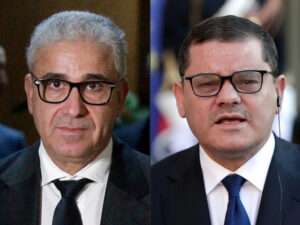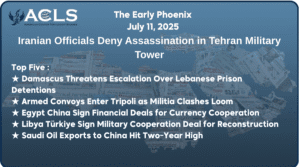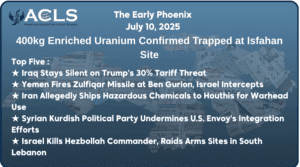The Region: A Middle East Newsletter
THE REGION is a weekly news digest summarizing significant Middle East developments that will be of interest to the English-speaking audience. The news items in THE REGION are curated by ACLS experts and drawn from a wide range of English, Arabic, and other regional language sources. Subscribe to this weekly newsletter and daily intercepts here.
Printable Version
Top Story: TURKEY: Terrorist Bombing in Istanbul; Turkey Blames the PKK–and Condemns the United States

On November 13, a terrorist bombing in a busy area of Istanbul frequented by tourists left six people dead and at least 81 wounded. In the aftermath of the attack, Turkish authorities arrested 46 people suspected of involvement in the bombing. Those arrested included a Syrian woman named Ahlam al-Bashar, whom Ankara accused of directly planting the bomb. Turkish authorities said al-Bashar, who had entered Turkey without documentation months before the attack, had confessed to being a member of the Syria-based YPG (a Kurdish-led militia affiliated with the Kurdistan Workers’ Party, or PKK), and to having received instructions for the attack from YPG leaders in Kobane, Syria. The YPG, in turn, denied responsibility for the attack and suggested the Turkish government had carried out the attack itself to establish a pretext for a new military incursion into northeast Syria.
The incident has prompted outrage in Turkey against the United States, which Ankara has long criticized for its close partnership with the YPG-led Syrian Democratic Forces. Turkey’s Interior Minister vehemently accused the United States of having enabled the YPG to carry out the November 13 and other terrorist attacks and rejected messages of condolence from the U.S. Embassy in Ankara. The bombing has thus resulted in a low point in U.S.-Turkey relations.
Erdogan Warns Against Isolating Russia And Builds New Economic Fronts

Turkish President Erdogan said on November 10 that the reason he was able to convince Russia’s Putin to allow the return of the Ukrainian grain export agreement was because there is a relationship of “trust and solidarity” between them. Erdogan warned that the cost of isolating Russia could be “unlimited,” while his government announced this week that it will begin purchasing Russian gas in rubles. Meanwhile, CIA Director William Burns traveled to Ankara to meet his Russian counterpart and reportedly convey U.S. messages “regarding the consequences of Russia’s use of nuclear weapons.”
Meanwhile, Putin’s special envoy to the Middle East and Africa, Mikhail Bogdanov, announced on November 9 that Turkey, Russia, and Iran will hold a new round of talks in Astana that will include representatives of the Assad regime, the Syrian opposition, and international observers. Bogdanov also said that Russia and Turkey were in talks to allow Moscow to regain access to Turkish airspace for Russian military flights to Syria.
On the economic front, Samsun Yurt, one of Turkey’s largest defense manufacturers, announced this week that it will open its first military factory in the United States in 2023. Turkey also announced that it intends to establish a gas and oil exploration company in Algeria in addition to the home appliance factory in Egypt.
IRAN
IRGC Claims to Have a Hypersonic Missile That Can Strike Israel and Says Foreign Enemies are “Terrified” of Tehran
In an IRGC ceremony on November 11, the Iranian regime’s IRGC leadership claimed they had developed a hypersonic missile that could reach Israel in just minutes. The regime-aligned Tehran Times published this IRGC claim in an article entitled “Less than 4 minutes to Tel Aviv,” in which the IRGC’s top aerospace commander said the missile could be demonstrated soon and also claimed that the missile would be able to “pierce modern defensive shields.” At the same event, IRGC commander Hossein Salami bragged that the Iranian regime’s foreign adversaries are “afraid, and regularly send us messages, requesting not to hit back.”
Internationally, the Iranian regime lashed out against France on November 14 after President Macron issued statements of support to “the grandchildren of the revolution who are carrying out a revolution and are devouring it.” The Iranian foreign ministry called the French president’s comments “a slip of the tongue,” and said that Macron was a “victim of fake news, getting ahead of himself and crass.” Commenting on Macron’s meeting with four Iranian opposition activists, including the US-based Masih Alinejad, the Iranian foreign ministry spokesman said that “It is surprising that the president of a country claiming to support freedom, lowers his level and meets with a hated pawn who, in recent months, has clearly tried to spread hatred, violence, and terrorist acts.”
The Iranian regime’s announcements are part of a pattern of provocative statements and moves Tehran has been making since the beginning of the protest movement in Iran. Asked for comment by Fox News, a Pentagon spokesman said the United States was skeptical of the Iranian regime’s claims to have developed a hypersonic missile. The Tehran Times article made no mention of the fact that the Iranian regime has a long track record of exaggerating their military capabilities.
Iranian Regime Continues Deadly Crackdown on Iran’s Civil Protest Movement
 The Iranian regime has detained at least 14,000 people as part of its ongoing violent crackdown against protestors, with widespread reports of torture and sexual abuse to go along with extrajudicial killings. A civic group calling itself the “Committee to Follow Up on the Status of Detainees” investigated arrests in 125 cities across Iran and documented horrific conditions and treatment of the detained. The committee reported that it was able to identify 1600 of the 14,000 detainees. Of these, 969 are ordinary citizens, 393 students, 145 civil activists, 42 journalists, 40 political activists, 38 women’s rights activists, 26 attorneys, and 65 minors. The committee released testimonies of many detainees and their family members documenting inhumane conditions with excessive and unnecessary violence. Nine detainees were accused of “warfare” and “corruption on earth,” charges that could result in the death penalty. One man reportedly suffered severe head fractures from being hit with a “mallet or a heavy object.” One woman reportedly was forced to strip naked twice while regime security officials told her, “If you are raped here, you cannot protest! You are looking for nudity and you have to pay for it!” Others reported being kept in prison wards with criminals who later sexually abused them. One detainee reported that an interrogator accessed his private photos with his girlfriend and threatened to publish them in the media if the detainee continued protest activities after being released.
The Iranian regime has detained at least 14,000 people as part of its ongoing violent crackdown against protestors, with widespread reports of torture and sexual abuse to go along with extrajudicial killings. A civic group calling itself the “Committee to Follow Up on the Status of Detainees” investigated arrests in 125 cities across Iran and documented horrific conditions and treatment of the detained. The committee reported that it was able to identify 1600 of the 14,000 detainees. Of these, 969 are ordinary citizens, 393 students, 145 civil activists, 42 journalists, 40 political activists, 38 women’s rights activists, 26 attorneys, and 65 minors. The committee released testimonies of many detainees and their family members documenting inhumane conditions with excessive and unnecessary violence. Nine detainees were accused of “warfare” and “corruption on earth,” charges that could result in the death penalty. One man reportedly suffered severe head fractures from being hit with a “mallet or a heavy object.” One woman reportedly was forced to strip naked twice while regime security officials told her, “If you are raped here, you cannot protest! You are looking for nudity and you have to pay for it!” Others reported being kept in prison wards with criminals who later sexually abused them. One detainee reported that an interrogator accessed his private photos with his girlfriend and threatened to publish them in the media if the detainee continued protest activities after being released.
GULF REGION
China’s President Visits Saudi Arabia Eyeing an Opportunity to Replace Uncle Sam
Despite Gulf leaders’ concern about a possible “cold war” between the United States and China, Riyadh is reportedly determined to proceed in developing relations with Beijing, according to a report by An Nahar. In his visit to the Kingdom last week, Chinese President Xi Jinping enjoyed Saudi state hospitality at the same level as President Trump in May 2017, in stark contrast to the meager Saudi welcome during President Biden’s visit last June. Trade between Saudi Arabia and China accounts for 26.3 percent of China’s trade with Arab countries, and China is the largest importer of Saudi oil at 1.8 million barrels daily. China considers Saudi Arabia the most important Middle Eastern country, and consequently President Xi has offered the Saudis new business opportunities in the hopes of filling the void created by a diminishing American presence in the region. In doing so, An Nahar notes, Xi is launching a new round of strategic competition that America cannot win without the Middle East on its side.
Meanwhile, on November 16, just two days after Xi’s visit to the Kingdom, Saudi Crown Prince Mohammed bin Salman led a large Saudi delegation on an official visit to South Korea, one of China’s major regional rivals. The Crown Prince was accompanied by Riyadh’s Ministers of Energy, Defense, National Security, Foreign Affairs, Economy, and Planning.
IRAQ
Iran-linked Militia Claims to Have Murdered American Aid Worker as Revenge for Qassem Soleimani’s Death
This week, an Iranian-sponsored Iraqi militia calling itself Saraya Ahl al-Kahf claimed responsibility for killing American aid worker Stephen Troell, and asserted that Troell’s murder was an act of revenge for the 2020 killing of IRGC commander Qassem Soleimani. Meanwhile, Iraq’s new Prime Minister Mohammed Shia al-Sudani has failed to identify and arrest the perpetrators of the murder, ten days after Troell was shot while leaving his Baghdad home. Sudani’s latitude to take action against the militias presumed to be responsible for the murder is in doubt, particularly as Sudani has appointed to his cabinet some of those militias’ political representatives. Sudani’s Minister of Higher Education, Naim al-Aboudi, is a member of the Iran-backed Asa’ib Ahl al-Haq militia.
Militia-Affiliated Education Minister Gave Out Thousands of Fraudulent Degrees
Aboudi came under fire just days after he took his post when allegations emerged on social media that he was involved in falsifying 27,000 academic degrees from three universities in Lebanon. Recipients of the bogus degrees include Iraqi chief judge Fayeeq Zidane, former Secretary-General of the Council of Ministers Hamid Amin, and Aboudi himself, along with many other Iraqi officials. The degrees ostensibly come from universities affiliated with the Supreme Shiite Council of Lebanon. The Ministry of Higher Education responded to the allegations by pointing out that “many political leaders have degrees from these universities.”
IRGC Bombs Erbil In Anger Over Media Coverage of Iranian Protests
Elsewhere in Iraq, on November 14 the IRGC shelled Iraq’s Kurdistan region with drones and missiles, killing two people and wounding eight. Hours after the attack, Iran’s Quds Force commander, Ismail Qaani, arrived in Baghdad on an unannounced visit. According to Iraqi and Iranian media, Qani met with Iraq’s President and Prime Minister, as well as with leaders of the Iran-backed Coordination Framework and its associated armed factions. Al-Arabiyah reported that the reason Iran launched the attacks against Erbil was to punish Iraqi Kurdistan for broadcasting videos of protests taking place in Iran.
Iraq Loses India as an Oil Customer; Iran Plans to Sell Iraq More Gas
In the economic sphere, Iraq announced that it lost more than a quarter of a billion dollars of revenue during October as India’s imports of Iraqi oil decreased by about 10%. India’s imports of Iraqi oil have reached their lowes levels in 20 months as Indian refineries increased their purchases of discounted Russian crude and boosted their purchases of West African crudes. Meanwhile, the National Iranian Gas Company announced on Wednesday the start of bilateral negotiations to extend Iran’s gas exports with Iraq. The company’s director stated that “Iraq needs gas energy, and Iran intends to extend the contract with it to provide its needs.”
YEMEN
Houthis Attack Fuel Ship; U.S. Navy Seizes Houthi Drugs
The Iran-backed Houthi militia on November 9 unsuccessfully targeted a fuel ship in the port of Qena in Yemen’s Shabwa Governorate. If successful, the attack would have created a major environmental disaster in the Arabian Sea. On the same day, local Yemeni media reported that the United States had offered via Oman to pay the salaries of Houthi employees if the Houthis were to agree to extend Yemen’s cease fire. The head of the Houthi political council claimed the United States made the offer out of fear, after Houthi officials threatened to take actions against alleged U.S. maneuvers to obtain oil from Yemen’s oil-rich Hadramout governorate.
Authorities at Yemen’s port of Socotra announced last week they had confiscated a ship loaded with drugs bound from Iran to the Houthis. According to recent reports, the Houthis’ revenue from smuggling crystal methamphetamine and other drugs from Iran exceeds $6 billion dollars per year. A few days later, the U.S. 5th Fleet intercepted a fishing vessel carrying over 70 tons of missile fuel from a boat heading from Iran to the Yemeni coast. The materials seized are sufficient to fuel ten ballistic missiles, but the 5th Fleet also found more than 100 tons of explosive fertilizer aboard the vessel.
NORTH AFRICA
Russia Moves to Secure Algeria as an Ally, to the Detriment of Europe and Morocco
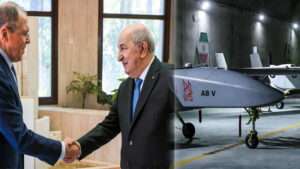 Algeria is the world’s fifth-largest gas producer, ranks among the top 20 oil producers, and has the largest oil production, refining, and transport firms on the African continent. Perhaps in response to speculation that the European Union has come to view Algeria as a potential alternative to Russia for the supply of gas, Russia held military talks with Algeria on November 10 to discuss ways to expand the countries’ military cooperation. The Algerian Foreign Minister also announced that preparations are underway for Algerian President Tebboune to visit Moscow before the end of the year, while Russian Foreign Minister Sergei Lavrov said the plans reflected a “new quality” of relations between Moscow and Algiers. Moscow’s pursuit of closer relations with Algiers should be seen as an effort by Russia to move quickly to block any prospect of Algeria displacing Russia as a prime supplier of Europe’s energy.
Algeria is the world’s fifth-largest gas producer, ranks among the top 20 oil producers, and has the largest oil production, refining, and transport firms on the African continent. Perhaps in response to speculation that the European Union has come to view Algeria as a potential alternative to Russia for the supply of gas, Russia held military talks with Algeria on November 10 to discuss ways to expand the countries’ military cooperation. The Algerian Foreign Minister also announced that preparations are underway for Algerian President Tebboune to visit Moscow before the end of the year, while Russian Foreign Minister Sergei Lavrov said the plans reflected a “new quality” of relations between Moscow and Algiers. Moscow’s pursuit of closer relations with Algiers should be seen as an effort by Russia to move quickly to block any prospect of Algeria displacing Russia as a prime supplier of Europe’s energy.
Meanwhile, on November 15, the Russian and Algerian militaries began joint drills less than 50 km from the Moroccan border. The border zone has become a tense area, as Tehran in recent days confirmed that it will equip the Algerian army and the Polisario Front with military drones. The Russian-Algerian military rapprochement in recent weeks is notable as Algeria recently announced it would increase its military budget by 130% by 2023.
Morocco Concerned by Threat from Iran and Algeria

As Russia and Algeria explored closer relations, on November 7-8 Morocco and the United States signed agreements in Washington to cooperate on counterterrorism, maritime security in the Mediterranean, and other pressing security issues on the African continent. During meetings at the Pentagon, the Moroccan delegation voiced concerns about the increasing threat of Iranian intervention and collusion with separatist movements in the Sahel-Sahara region.
As the military rivalry between them heats up, Morocco and Algeria are also racing one another to build gas pipelines linking their countries to Nigerian gas. The country that wins the race will be positioned to significantly step up gas deliveries to Europe at a time when the EU countries are eager to reduce their dependence on Russian gas.
Libya: Dbeibah Sends Armed Group to Block High Council Meeting
Libya’s Tripoli-based High Council of State accused Prime Minister Abdul Hamid Dbeibah of deploying security forces to prevent the council from holding its scheduled meeting in Tripoli on November 14. “For the first time since the Feb. 17 revolution of 2011, the head of government tries to prevent a sovereign institution from doing its work,” the High Council declared. Armored vehicles commanded by Dbeibah’s administration reportedly surrounded the hotel where the Council planned to meet, after which the hotel canceled the reserved conference room, citing “government instructions.” The Speaker of the rival eastern Libyan Parliament, Aguila Saleh, denounced the armed group besieging the members of the Supreme Council and called on Libya’s Attorney General to investigate the incident. The blocking of the High Council’s meeting came shortly after news broke that High Council chief Khaled al-Mashri and Aguila Saleh were nearing a political deal that could lead to elections for a new Libyan government and possibly displace Dbeibah from the premiership. US Ambassador to Libya Richard Norland, meanwhile, judged that “Libya has the technical ability to hold elections and what it needs is political will, nothing more.”
Expert Throws Cold Water on Beirut’s Gas Field Euphoria
Stuck in the worst economic crisis in Lebanon’s history, Lebanese leaders hope to redress their fiscal problems by beginning exploitation of Lebanon’s offshore gas field as early as 2023 and extracting gas from 2029 to 2049. But Beirut’s optimism for gas revenues may be misplaced, according to Lebanese experts. One environmental assessment warned that exploratory drilling could cut up to 1,000 square meters from Lebanon’s coast, changing the country’s shoreline and ecosystems for the next 50 years. Diana Kaissy, a regional oil and gas expert and board member of the International Transparency Initiative, told NOW Lebanon that “there is no proof that gas even exists” in the field off the coast of Naqoura that was the subject of the recent Israel-Lebanon maritime boundary agreement. Kaissy estimated that Lebanon’s gas revenues would reach at most a total of only $8 billion stretched across a period of 10 to 20 years, if Lebanon manages to fully extract the resources in the field. She observed that this amount is only a small fraction of Lebanon’s current debt of more than $100 billion–a figure that represents 150 percent of the country’s GDP.
EGYPT
In Leaked Audio, Egyptian Muslim Brotherhood Threatens Erdogan
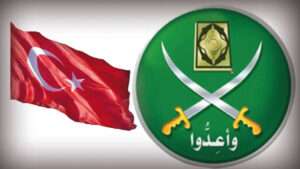 In response to the Turkish government’s arrest of Egyptian Muslim Brotherhood journalist Hussam Al-Ghamry in October, other Egyptian Muslim Brotherhood members residing in Turkey warned that if Turkey were to hand Al-Ghamry over to Egyptian authorities, they would retaliate by targeting Turkish President Erdogan. The Brotherhood’s threat was leaked from an October 28 discussion hosted on Clubhouse by Egyptian-American Muslim Brotherhood activist Mona El-Shazly.
In response to the Turkish government’s arrest of Egyptian Muslim Brotherhood journalist Hussam Al-Ghamry in October, other Egyptian Muslim Brotherhood members residing in Turkey warned that if Turkey were to hand Al-Ghamry over to Egyptian authorities, they would retaliate by targeting Turkish President Erdogan. The Brotherhood’s threat was leaked from an October 28 discussion hosted on Clubhouse by Egyptian-American Muslim Brotherhood activist Mona El-Shazly.
Turkey Will Build Factory in Egypt
Meanwhile, Turkey announced on November 15 that its largest household appliances manufacturer Arcelik is planning to invest $100 million in the building of a new factory in Egypt. The project will have a production capacity of 1.5 million devices annually and will create 2,000 direct jobs.
SUDAN
Riyadh to Fund Sudanese Government Projects
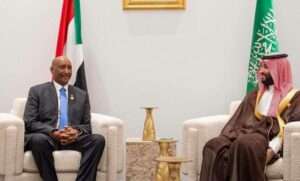 The Sudanese government announced on November 7 that Saudi Arabia has pledged to invest $3 billion in projects in Sudan. The pledge was reportedly made by Saudi Crown Prince Mohammed bin Salman when meeting Sudanese General Abdel Fattah al-Burhan at the COP27 climate summit in Sharm el-Sheikh, although the Saudi government did not mention the pledge in its own readout of the meeting.
The Sudanese government announced on November 7 that Saudi Arabia has pledged to invest $3 billion in projects in Sudan. The pledge was reportedly made by Saudi Crown Prince Mohammed bin Salman when meeting Sudanese General Abdel Fattah al-Burhan at the COP27 climate summit in Sharm el-Sheikh, although the Saudi government did not mention the pledge in its own readout of the meeting.
LEBANON
Lebanon Still Lacks a President, But Could Be Heading Toward Electing Another Army Chief to the Office
 The Lebanese parliament met six times in the past two weeks to vote for a successor to former President Michael Aoun, but no candidate came near the two-thirds majority required to elect a new president. The Iranian-backed Shiite militia Hizballah has not officially thrown its support behind any candidate, but is widely believed to prefer the pro-Assad Christian politician Suleiman Frangieh. Hizballah leader Hassan Nasrallah said Lebanon’s next president should be a politician who will not “betray” Hizballah or “stab the resistance in the back.” Other Lebanese parties anticipate that independent MP Michel Moauad–the son of a former president who may have been assassinated at the command of Hafez al Assad–could receive more than 43 votes in the next parliamentary session. But outside the parliamentary sessions, there are reportedly behind-the-scenes negotiations among Druze leader Walid Jumblatt, Parliament Speaker Nabih Berri, and, possibly, representatives of French President Macron to pave the way for a consensus candidate excluding Christian leaders Gebran Bassil, Franjieh, and Samir Geagea. The most-often mentioned potential alternative candidate is current Lebanese army chief General Joseph Aoun.
The Lebanese parliament met six times in the past two weeks to vote for a successor to former President Michael Aoun, but no candidate came near the two-thirds majority required to elect a new president. The Iranian-backed Shiite militia Hizballah has not officially thrown its support behind any candidate, but is widely believed to prefer the pro-Assad Christian politician Suleiman Frangieh. Hizballah leader Hassan Nasrallah said Lebanon’s next president should be a politician who will not “betray” Hizballah or “stab the resistance in the back.” Other Lebanese parties anticipate that independent MP Michel Moauad–the son of a former president who may have been assassinated at the command of Hafez al Assad–could receive more than 43 votes in the next parliamentary session. But outside the parliamentary sessions, there are reportedly behind-the-scenes negotiations among Druze leader Walid Jumblatt, Parliament Speaker Nabih Berri, and, possibly, representatives of French President Macron to pave the way for a consensus candidate excluding Christian leaders Gebran Bassil, Franjieh, and Samir Geagea. The most-often mentioned potential alternative candidate is current Lebanese army chief General Joseph Aoun.
Syrian Refugees Prefer “Death Boats” to Returning to Assad’s Lands
Concerning the Lebanese government’s continuing campaign to force Syrian refugees to leave Lebanon and return to Assad regime territories, the NGO Syrian Association for Citizen Dignity reported that the vast majority of refugees, despite the “horrific conditions” they face, do not want to return to Syria. A survey of 438 Syrians in Lebanon showed that they prefer to use the “death boats” to attempt the dangerous migration to Europe rather than return to areas of Syria under the rule of the Syrian regime. Meanwhile, a delegation of the opposition Turkish Democratic Party visited Lebanon to discuss the Syrian refugee question, meeting with the Syrian regime’s ambassador in Beirut and the Lebanese minister of Immigration to discuss refugee policy.
Hizballah Continues to Smuggle Drugs
As one of the top exporters of Captagon to the world, Lebanese Hizballah continues its smuggling activities. A shipment of 5 million Captagon pills inside “fiber boards” making its way to Abidjan through the port of Beirut was confiscated by Lebanon’s Internal Security Forces on November 7.
SYRIA
Assad Fighters Sent to Ukraine to Guard Russian Facilities
 Ukrainian and Syrian government officials claimed this week that Syrian regime fighters have been deployed to Ukraine. An anonymous Syrian government official told Middle East Eye that about 500 Syrian regime fighters had gone to Ukraine via Russia. The fighters were not sent to the front lines due to problems over language and coordination, but were tasked with guarding Russian-controlled facilities in Luhansk and Donetsk.
Ukrainian and Syrian government officials claimed this week that Syrian regime fighters have been deployed to Ukraine. An anonymous Syrian government official told Middle East Eye that about 500 Syrian regime fighters had gone to Ukraine via Russia. The fighters were not sent to the front lines due to problems over language and coordination, but were tasked with guarding Russian-controlled facilities in Luhansk and Donetsk.
HTS and Italy Cooperate to Arrest Fugitive Mafia Leader
On November 15, Idlib’s Public Security Service revealed that it had arrested Italian mafia leader Bruno Carboni as he was attempting to travel to the areas controlled by the Syrian regime. The Public Security Service is an organization affiliated with Abu Muhammad al-Jolani’s Hayat Tahrir al-Sham (HTS) militia. Carboni, who had been traveling from Turkey, was wanted by Italian authorities and was the subject of an international warrant by Interpol. The HTS affiliates reportedly arrested him and handed him over to Turkish government officials, who then handed him into Italian custody. The incident was an unusual instance of a European government appearing to officially cooperate with HTS, despite HTS’s former loyalty to Al Qaeda.
Syrian Regime Warns Ankara Over Istanbul Bombing
Syrian Foreign Minister Faisal Mikdad warned Turkey not to use the recent Istanbul terrorist attack as a pretext to launch attacks on Syria. In response to Turkey’s recent statements about the possibilities of further developing the relations with the Assad government, Mikdad said that Turkey would first have to end its sponsorship of terrorism, withdraw from Syrian territory, and cease its support to Hayat Tahrir al-Sham and ISIS, if Ankara wanted to prove its sincerity.
For questions about THE REGION or suggestions for topics to cover, contact the editor of THE REGION at [email protected]g.




